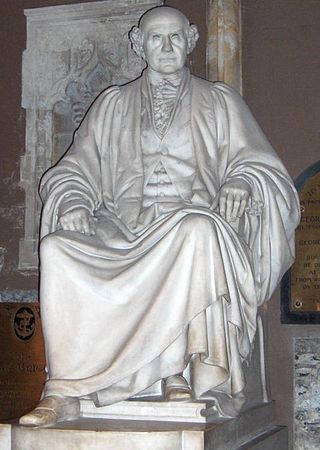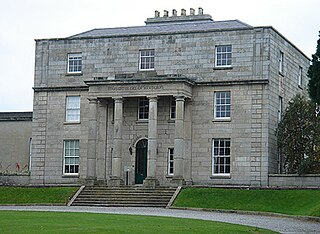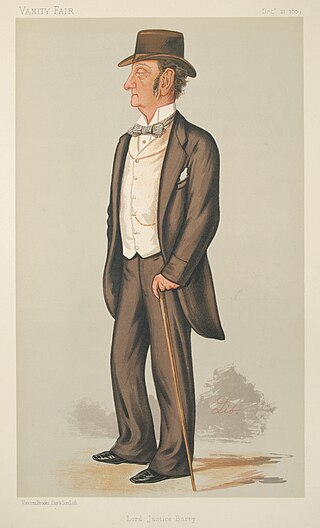
Francis Blackburne PC (Ire) KS was an Irish judge and eventually became Lord Chancellor of Ireland.

James Whiteside was an Irish politician and judge.
Joseph Devonsher Jackson PC was an Irish Conservative MP in the United Kingdom Parliament and subsequently a High Court Judge.
Sir Joseph Napier, 1st Baronet was an Irish Conservative Party Member of Parliament (MP) in the United Kingdom Parliament. He was also a barrister and judge, who served briefly as Lord Chancellor of Ireland.

Richard Moore PC was an Irish lawyer and judge.
William Digby Seymour (1822–1895) was a British lawyer and poet, and MP for Sunderland and Somerset.

Charles Robert Barry QC, PC was an Irish politician and lawyer who rose to become a Lord Justice of Appeal for Ireland.
This is a list of lawyers who held the rank of serjeant-at-law at the Bar of Ireland.
Sir Maurice Eustace was an Irish landowner, politician, barrister and judge of the seventeenth century who spent the last years of his career as Lord Chancellor of Ireland. This was an office for which he felt himself to be entirely unfit, and in which he was universally agreed to be a failure.
Sir Edward Sullivan, 1st Baronet, PC (Ire) was an Irish lawyer, and a Liberal Member of Parliament for Mallow, 1865–1870 in the House of Commons of the United Kingdom of Great Britain and Ireland. He was also Solicitor General for Ireland, 1865–1866, Attorney General for Ireland, 1868, Master of the Rolls in Ireland, 1870. Created a baronet, 29 December 1881, from 1883 to 1885 he was Lord Chancellor of Ireland.
Sir William Ryves (1570–1647) was a barrister and judge, and a member of a distinguished Dorsetshire family. He enjoyed a successful legal career in Ireland, holding office as Attorney-General for Ireland and as a justice of the Court of King's Bench (Ireland). For a time he acted as Deputy to the Lord Chancellor of Ireland.
Patrick Barnewall was a leading figure in the Irish Government of the 1530s and 1540s. He owed his position largely to his close links with Thomas Cromwell. He sat in the Irish House of Commons as MP for County Dublin, and held the offices of Solicitor General for Ireland and Master of the Rolls in Ireland. Today he is mainly remembered for his role in founding the King's Inns. He belonged to a junior branch of the family of Lord Trimlestown: his own descendants held the title Viscount Barnewall of Kingsland.
The Law Adviser to the Lord Lieutenant of Ireland was a Law Officer of the English Crown in nineteenth-century Ireland. The office lapsed in the 1880s, due apparently to concerns that it was becoming too political, but was briefly revived in the early twentieth century. It was abolished on the establishment of the Irish Free State in 1922.
John Tirel, or Tyrell was a prominent judge and statesman in fourteenth-century Ireland who held office as Serjeant-at-law and Chief Justice of the Irish Common Pleas.
Sir John Barnewall (c.1635-c.1705) was an Irish landowner, barrister and judge, who held several judicial offices, including that of Recorder of Dublin 1687-9.
Edward Somerton, or Somertoune was an Irish barrister and judge who held the offices of Serjeant-at-law (Ireland) and judge of the Court of King's Bench (Ireland) and the Court of Common Pleas (Ireland). He was born in Ireland, possibly in Waterford, although he lived much of his life in Dublin. By 1426 he was a clerk in the Court of Chancery (Ireland), and was paid 26 shillings for his labours in preparing writs and enrolment of indentures,. In 1427 he is recorded in London studying law at Lincoln's Inn. He returned to Ireland and was again in the Crown service by 1435, when he was ordered to convey lands at Beaulieu, County Louth to Robert Chambre, one of the Barons of the Court of Exchequer (Ireland). He was appointed King's Serjeant for life in 1437; he also acted as counsel for the city of Waterford, a position subsequently held by another future judge, John Gough.
Walter Berwick (1800–1868) was an Irish judge, who perished in the Abergele rail disaster of 1868. He was a much loved public figure, especially in Cork, where he is commemorated by the Berwick Fountain on the Grand Parade in Cork city. He presided over the official inquiry into the Dolly's Brae conflict in 1849.
Sir John Bourke Howley (1789-1866) was an Irish barrister and Law Officer who held office as Serjeant-at-law (Ireland) for many years. Despite his obvious desire to be promoted to the Bench, he never became a judge.

Hewitt Poole Jellett was an Irish barrister and judge. He is notable for holding the office of Serjeant-at-law (Ireland) for more than twenty years until his death at the age of eighty-six.
Walter FitzWilliam Cotterell was an Irish barrister and Crown official of the late fourteenth century. He was Serjeant-at-law (Ireland) and acted from time to time as a judge of gaol delivery and of assize, although he was never a justice in the Royal Courts. The evidence suggests that he was a conscientious and hard-working official who enjoyed the complete trust of the English Crown.